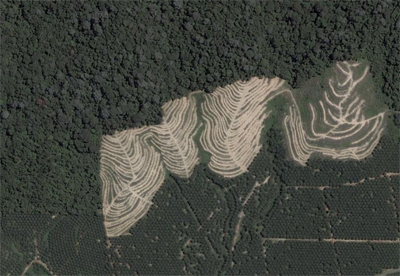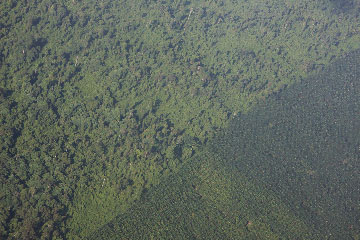Palm oil industry relies on greenwashing to mislead consumers, alleges report
mongabay.com, October 8, 2008
The Malaysian palm oil industry is relying on marketing tactics that mislead the public about its environmental performance rather than taking effective steps to become "greener" alleges a new report from the environmental group Friends of the Earth (FOE).
"Malaysian Palm Oil: Green Gold or Green Wash?" [PDF] says that the Malaysian Palm Oil Council (MPOC), an industry body, is putting considerable effort into advertising Malaysian palm oil as an eco-friendly alternative to fossil fuels and other oilseeds, while glossing over the negative impacts of the crop, including greenhouse gas emissions, deforestation, pollution, and social injustices. The report calls upon the Malaysian government — in particular the Sarawak state government — to address false claims by the industry and implement policies that "honor the rights and wishes of Sarawak's indigenous peoples and the need for a better protection of the environment."
"With this report, Friends of the Earth groups from Malaysia and Europe are confronting the misleading claims of the Malaysian palm oil lobby and informing decision makers about the serious sustainability challenges the sector faces on the ground," states the report, which cites a number of examples of what it considers misleading claims by the palm oil industry. "This Friends of the Earth report challenges MPOC's 'green' claims, so as to prevent decision makers, including consumers, from being misled. Under present conditions, an acceptance of Malaysia's palm oil claims will legitimize further tropical deforestation, human rights violations against indigenous peoples and suppression of public participation in government decision making. All that could happen — and has happened — under the banner of 'sustainable palm oil' and 'green energy'."
Oil palm plantation expansion at the expense of natural forest in the Malaysian state of Johor. Image courtesy of NASA's Earth Observatory / Google Earth.
The report highlights the proliferation of pro-palm oil web sites — which FOE says are underwritten by MPOC — as well as the appearance of dubious environmental NGOs supporting oil palm expansion; the use of blogs and comment spam to attack critics of palm oil; and the release of marketing videos and editorials that make questionable claims about the ecological impact of oil palm plantations. One video even uses iguana and hummingbirds — species found nowhere near Malaysia — to suggest that biodiversity thrives in plantations when a mountain of scientific studies show that oil palm estates are biologically impoverished compared even with heavily logged forests.
"The generic claim of the Malaysian palm oil lobby that 'Malaysian palm oil is sustainable' is false and potentially misleading," states the report, which then lays out a series of recommendations to improve the sustainability of the palm oil sector in Malaysia, including strict enforcement of 'no burn' policies for land management, establishing better protections for indigenous communities, implementing a ban on natural forest conversion for oil palm plantations, engaging in meaningful dialog between stakeholders, and facilitating public participation in Environmental Impact Assessments prior to the approval and commencing of new estates. FOE says that palm oil customers — including Western companies that buy palm oil — and investors in plantation companies should pressure producers to improve the sustainability of the industry.
Oil palm plantations near Lahad Datu, Malaysia. Photo by Rhett A. Butler
For their part, some oil palm producers are working to reduce the environmental impact of existing estates by curtailing use of pesticides and fertilizers; capturing palm oil mill effluent before it goes enters streams and creeks; cutting burning of plantation waste; and maintaining and even expanding forest corridors along waterways to create connectivity between forest fragments and reduce erosion. Efforts to boost palm oil yields through selective-breeding programs further offer the potential increase net production without the need to expand the area under cultivation. Finally because oil palm is the highest-yielding mass market oilseed, responsible palm oil production offers more vegetable oil per unit of area than other widely-grown crops including soy, canola, or rapeseed. Thus oil palm expansion on abandoned agricultural lands could offer producers a more effective way to sustainably meet growing demand for vegetable oils than with other oilseeds.
Full report | Executive summary












No comments:
Post a Comment